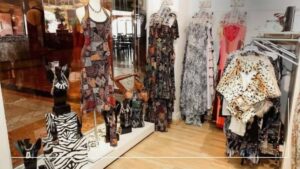Building a fashion brand in Nigeria is no rocket science. Nevertheless, one can find it a daunting task to nurture a clothing business due to the current economic situation in the country.
However, this article aims to streamline the process to help entrepreneurs seamlessly start a small clothing business from home in Nigeria and make money from it.
This guide will walk you through the entire process, from setting up your business to selling your clothes to potential customers.
How To Start A Small Clothing Business from Home in Nigeria
- Step 1: Research and Planning
- Step 2: Setting Up Your Business
- Step 3: Create Your Brand
- Step 4: Source Your Clothes or Materials
- Step 5: Pricing Your Products
- Step 6: Marketing Your Clothing Business
- Step 7: Delivering Your Products
Step 1: Research and Planning
Before launching your small clothing business, thorough research and planning are essential. This step is about laying a solid foundation to ensure your business succeeds.
Here are some highlighted steps to take when researching and planning:
1.1 Choose Your Niche
A niche is a specific segment of the clothing market that you want to focus on, and selecting the right niche is critical for the success of your business.
This helps to focus on a particular group of customers, which one can in favour design products to meet their specific preferences, making the brand more recognizable and desirable.
Here are some popular clothing niches one can consider:
Women’s Clothing:
Women’s fashion is one of the most popular and competitive niches in the clothing industry. This category covers a wide range of styles, from casual wear to formal dresses, and even work attire.
You could specialize further within this niche by offering categories such as Maternity Wears, Plus-Size Fashion, Modest Fashion or any other sub-niches that you deem fit for you.
Men’s Clothing:
Though less crowded than women’s fashion, the men’s clothing niche is growing steadily.
Many men are now more fashion-conscious, and there is a demand for clothing that combines style and comfort. Within the men’s niche, you could specialize in casual, normal or street wears.
Children’s Clothing:
Children’s clothing is another lucrative niche with constant demand. Parents are always looking for quality, durable, and affordable clothing for their children, which makes this niche attractive.
It also provides opportunities for creativity, such as designing colorful and playful outfits for kids.
1.2 Understanding The Market
Researching the market is also an important step to consider when starting a clothing business. It helps to understand what potential customers really want. For example, current trending styles, and how to position one’s brand to meet demand.
In Nigeria, where fashion is diverse and rapidly changing, knowing the market provides a competitive edge. Visit local markets in Nigeria, such as the Balogun market which is situated in Lagos, Ariaria Market in Aba, or Wuse Market in Abuja, are hubs for fashion.
If touring is not an option to consider, then researching online stores can be a good option too. Online stores such as Jumia, Konga, 1688 and other clothing extensions are a great alternative to understand market trends.
1.3 Analyze the Competition
Analyzing a business competitive rate involves studying other businesses in the same niche as yours. This practice helps to gain valuable insights into what works well in the industry and also outline opportunities to seize.
Find out what products other businesses offer, how they price their clothes and market them to customers as well.
In addition to analyzing business competitors, their social media presence is a good place to start. Checkout for their branding, advertising efforts, then sum them up in a spreadsheet where it can be easily analyzed. This way, one can lay hands on their audience engagement, promotions, and content.
Step 2: Launching The Business
With a solid plan in place, the next step is to bring your clothing business to existence. This is where the real adventure begins, as you seamlessly dive into the exciting process of officially launching your clothing brand, laying the groundwork for future growth and success.
This process involves that you:
2.1 Business Registration
It’s important to register your business to show that it is legitimate and legal. In Nigeria, you can register your business with the Corporate Affairs Commission (CAC).
Registering your business gives you more credibility and protects your brand name.
2.2 Get Necessary Permits and Licenses
Depending on your location and the size of your business, you may need permits or licenses to run your clothing business from home. You can check with local authorities to know what’s required.
2.3 Create a Budget
When designing clothes, a significant portion of the budget will be allocated towards purchasing materials. Fabric is often the biggest expense, with choices depending on the niche. For example, Ankara fabric is popular for traditional African clothing, while cotton and polyester are commonly used for casual wear.
In addition to fabric, there are essential sewing notions like thread, zippers, and buttons that are necessary for assembling each piece of clothing. Tools such as pattern paper, scissors, and sewing machines are required when designing in-house.
For those working with tailors, it’s important to account for the costs of outsourcing, as materials may need to be provided.
Careful planning of material purchases can help avoid overspending and ensure everything necessary is in place to maintain the quality of the clothing line.
The cost of starting a small clothing business in Nigeria varies widely depending on whether clothes are being designed in-house or ready-made items are being resold.
Below are rough estimates that gives an idea of what to expect;
- Designing clothes: ₦100,000 – ₦500,000
- Reselling clothes: ₦50,000 – ₦200,000
- Marketing and promotions: ₦30,000 – ₦100,000
Step 3: Creating a Brand
A brand is what makes a clothing business unique and helps customers remember it. Consider elements such as the business name, logo, and most importantly, the overall identity. This combination allows returning customers to easily recognize the brand.
3.1 Building an Online Presence
The importance of building an online presence can never be over emphasized, especially in the clothing industry where online transactions are favoured the most. Since you’re starting from home, your online presence will be key to attracting customers.
Maximize the availability of social media and a website or online store. Create business accounts on platforms like Facebook and Instagram, which are great tools for showcasing your business with pictures or engaging videos and building a community of shoppers.
On the other hand, customers can buy directly from a website or online store. Creating one is not expensive as one can simply utilize platforms like Shopify, Jumia, or Konga to easily set up an online store.
Adding to this, social media platforms like Facebook and Instagram offer targeted advertising options that can reach a wide audience, and collaborating with local influencers can boost your brand’s credibility.
Step 4: Source For Clothes and Materials
There are various options available to stock up. But these are mainly based on one’s desired niche, nature of clothes, and designs.
If designing clothes is an option available to choose from, typically one would need to buy fabric and sewing materials from local markets, find a tailor or learn to sew if you don’t know how, or come up with unique designs that reflect your brand and target market.
Nevertheless, if reselling Ready-Made clothes is a good option for you, buy clothes in bulk from wholesalers in NIgeria popular markets such as Tejuosho Market (Lagos), Ariaria International Market (Aba), Balogun Market (Lagos)
Buying in bulk will give you lower prices, allowing you to sell at a profit.
Step 5: Pricing Your Products
Pricing is a key factor in your business success. You need to price your clothes in a way that covers your costs and leaves room for profit. Here’s a simple way to price your products:
Imagine you’re selling two products; a custom-made Ankara dress and a ready-made T-shirt. For the Ankara dress, you purchase 3 yards of high-quality fabric at ₦2,000 per yard, totaling ₦6,000 for the fabric.
You’ll also need to add other costs like thread, zippers, and labor, which might add another ₦2,000, bringing the total production cost of the dress to ₦8,000. On the other hand, for the ready-made T-shirt, you buy it wholesale at ₦2,000 per piece.
Once you’ve determined the cost of goods, it’s time to add your profit margin. A common profit margin is 50%, but this can vary depending on your target market and competition.
For the Ankara dress, you can add a 50% margin to the ₦8,000 cost, which means you’d add ₦4,000 as profit. For the T-shirt, a 50% profit margin would add ₦1,000 to your ₦2,000 purchase cost.
Finally, calculate the selling price by adding your profit margin to the cost of goods. For the Ankara dress, the total selling price would be ₦8,000 (cost) + ₦4,000 (profit), giving you a final price of ₦12,000. Similarly, for the T-shirt, the selling price would be ₦2,000 (cost) + ₦1,000 (profit), making the final price ₦3,000.
This simple formula ensures that both your custom designs and ready-made items are priced fairly, covering all your expenses and leaving you with a sustainable profit.
Adding to that, check what competitors are charging so that your prices are competitive and affordable.
Step 6: Marketing
Marketing your small clothing business can be highly effective through several key strategies.
Social media ads on platforms like Facebook and Instagram allow you to target specific groups based on interests, location, and demographics, helping you reach a large audience on a budget.
Word of mouth is also powerful—encourage friends, family, and satisfied customers to promote your business, and offer discounts or freebies to incentivize referrals. Collaborating with influencers is another great way to increase visibility and credibility.
Partnering with influencers in your niche can boost your brand’s exposure and build trust with potential customers.
Step 7: Product Delivery
When customers start placing orders, delivering their products efficiently is essential to ensure a smooth experience and maintain their satisfaction.
For local customers, offering a pickup option can be convenient and cost-effective. Arrange a central pickup point or allow customers to collect their orders directly from your home or workspace. This method can be particularly useful and helps to minimize delivery costs.
For customers far from your location in Nigeria, partnering with reliable delivery services is beneficial. You can work with well-known logistics companies like GIG Logistics, DHL, or local couriers to handle nationwide deliveries.
These companies offer various delivery options, from standard to express services, allowing you to cater to your customers’ preferences and needs.
Ensure that you choose a delivery partner with a strong track record of timely and secure deliveries, as this helps build trust and encourages repeat purchases.
Why Start a Clothing Business from Home in Nigeria?
Starting a small clothing business from home in Nigeria offers several compelling advantages, making it an ideal option for aspiring entrepreneurs.
Below are some key reasons why launching a home-based clothing business is a smart choice, along with helpful tips on how to maximize each benefit.
1. Low Startup Costs
One of the most significant benefits of starting a clothing business from home is that it requires minimal upfront investment.
Traditional businesses often need expensive storefronts, employees, and utilities, but a home-based business can cut many of these costs.
2. Flexibility
A home-based clothing business offers the freedom to set your own schedule, allowing you to work around other commitments, such as family or studies.
Here’s how to take advantage of this flexibility:
Set Your Own Hours: You can choose to work early in the morning, late at night, or whenever you’re most productive.
This is especially useful if you have children, are pursuing education, or have other responsibilities. For instance, you could dedicate evenings to packaging orders or weekends for designing new clothes.
3. Growing Fashion Industry in Nigeria
Nigeria’s fashion industry is expanding rapidly, with a growing demand for locally made clothes, African prints, and unique designs.
This presents numerous opportunities for new business owners as Nigerians, especially young people, are increasingly looking for trendy, modern, and culturally inspired fashion.
Whether it’s traditional Ankara designs, casual wear, or urban street fashion, there’s a growing appetite for a wide variety of clothing styles.
The clothing business is competitive, but with a unique niche and strong branding, you can stand out. Focus on offering excellent customer service and high-quality products.
Remember, consistency and dedication are key to making your clothing business a success. Keep learning, adapting, and improving, and your small business would grow into a successful brand in Nigeria’s booming fashion industry.




